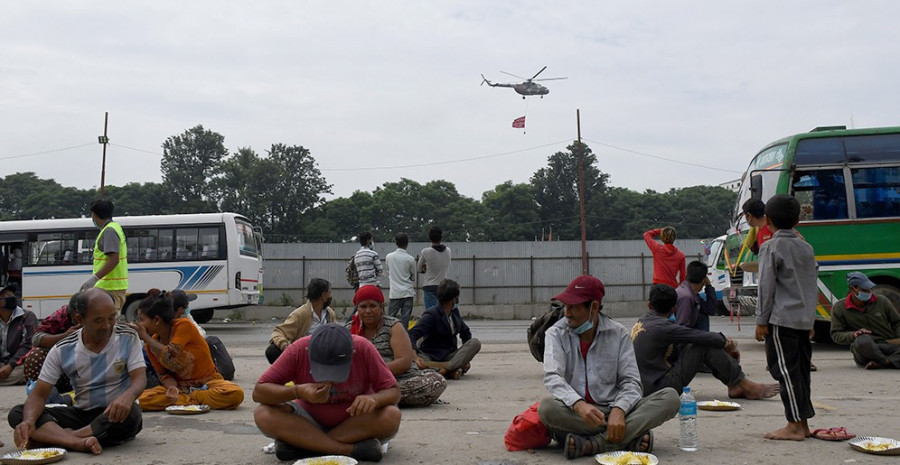Valley
Kathmandu Metropolitan City to remove free food distribution from Khula Manch
Voluntary organisations who have been distributing food wonder how they will now feed the hungry and want an alternative location.
Anup Ojha
Bablu Gupta is worried for the hundreds of poor and hungry whom he feeds at Khula Manch, at the heart of Kathmandu.
After the nationwide four-month-long lockdown was imposed on March 24, daily wage earners like porters, bus conductors and labourers would come to the open space knowing that they would get two hot meals of daal bhat and tarkari a day.
[Read: Constitution Day is like any other day for city’s working class hit by pandemic]
Gupta had created a Facebook group—100 Group—with other like-minded people and volunteer organisations to feed all those who came, some with whole families with children in tow.
But from Tuesday he does not know how he will feed them. Not because he has run out of resources but because Kathmandu Metropolitan City on Monday banned free meal distribution on the grounds.
“This is going to be a great misfortune,” said Gupta. “These people with hungry stomachs will fight back.”
His organisation, however, has not received any written notice from the city offices to stop feeding the hungry there.
“We have announced to ban these groups because they had not taken permission from Kathmandu Metropolitan City to distribute food at Khula Manch,” said Ishwor Man Dangol, spokesperson at the city.
Different groups have been feeding the hungry at the location for the last seven months.
“We had tried to coordinate with the city but it didn’t respond,” said Gupta from the 100's group.
It is not only the good samaritans and the hungry that are against the decision. The deputy mayor of the city is also unhappy.
“Actually, feeding these jobless poor is the responsibility of Kathmandu city. Even the federal government should have been looking after them,” said Deputy Mayor Hari Prabha Khadgi. “But youths took an initiative and did the government’s job, and now the city is chasing them out.”
Kathmandu Metropolitan City has its own reasons for the decision. Dongol said the city took the decision after it got complaints from residents that feeding free food was dirtying Khula Manch.
“It is a question of hygiene, as they do not give water, and now there are buses parked on the ground too and so it pollutes the area,” said Dangol.
However, there are no residential areas adjacent to the grounds.
According to Gupta, every day a total of 700 hungry people come to Khula Manch to get free meals.
Kathmandu Metropolitan City has been widely criticised for not being able to handle the spread of Covid-19 cases.
Mayor Bidya Sundar Shakya had announced on August 10 that he would build a 5,000-bed integrated isolation centre but nothing has come of it. He himself was infected with the coronavirus but spent his days of isolation at a luxury five star hotel in the second week of September.
While Lalitpur Metropolitan City officials visited the infected in home isolation to boost their morale, Kathmandu city had no such plans. On Monday, Lalitpur city started distributing masks in crowded areas while Kathmandu city officials said such an initiative was “impossible”.
Instead, Kathmandu city wants to stop the distribution of free hot meals by voluntary groups.
According to Deputy Mayor Khadgi, the issue was not discussed with her. “I think the ministry has directed the mayor to take this decision, feeling embarrassed by these youths’ work,” said Khadgi.
She did not elaborate which ministry the orders came from but clearly said the federal government was not happy with the work youths have been doing.
On September 19, when nearly 200 hungry people were being fed at Khula Manch, the country’s dignitaries, including President Bidya Devi Bhandari, Vice President Nanda Bahadur Pun and Prime Minister KP Sharma Oli, were observing the Constitution Day celebrations which had caused widespread criticism.
“Before Kathmandu Metropolitan City tells us to go away from here, it should find a proper place to feed these people,” said Gupta. “They may not have the money to buy food even though restaurants or eateries are open. We can’t let them stay hungry.”




 13.12°C Kathmandu
13.12°C Kathmandu.jpg)













